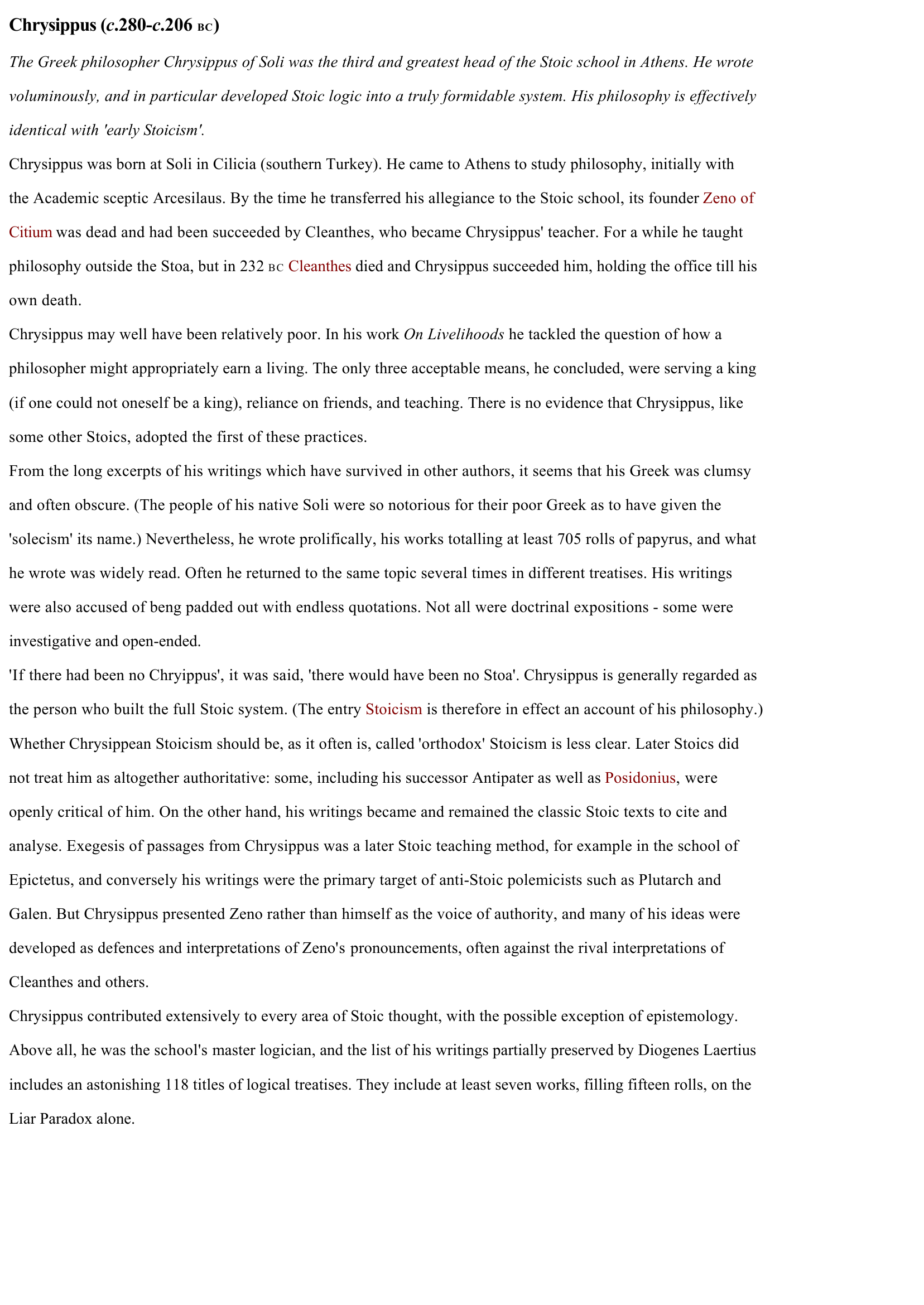Chrysippus
Extrait du document
«
Chrysippus (c.280-c.206 BC )
The Greek philosopher Chrysippus of Soli was the third and greatest head of the Stoic school in Athens.
He wrote
voluminously, and in particular developed Stoic logic into a truly formidable system.
His philosophy is effectively
identical with 'early Stoicism'.
Chrysippus was born at Soli in Cilicia (southern Turkey).
He came to Athens to study philosophy, initially with
the Academic sceptic Arcesilaus.
By the time he transferred his allegiance to the Stoic school, its founder Zeno of
Citium was dead and had been succeeded by Cleanthes, who became Chrysippus' teacher.
For a while he taught
philosophy outside the Stoa, but in 232 BC Cleanthes died and Chrysippus succeeded him, holding the office till his
own death.
Chrysippus may well have been relatively poor.
In his work On Livelihoods he tackled the question of how a
philosopher might appropriately earn a living.
The only three acceptable means, he concluded, were serving a king
(if one could not oneself be a king), reliance on friends, and teaching.
There is no evidence that Chrysippus, like
some other Stoics, adopted the first of these practices.
From the long excerpts of his writings which have survived in other authors, it seems that his Greek was clumsy
and often obscure.
(The people of his native Soli were so notorious for their poor Greek as to have given the
'solecism' its name.) Nevertheless, he wrote prolifically, his works totalling at least 705 rolls of papyrus, and what
he wrote was widely read.
Often he returned to the same topic several times in different treatises.
His writings
were also accused of beng padded out with endless quotations.
Not all were doctrinal expositions - some were
investigative and open-ended.
'If there had been no Chryippus', it was said, 'there would have been no Stoa'.
Chrysippus is generally regarded as
the person who built the full Stoic system.
(The entry Stoicism is therefore in effect an account of his philosophy.)
Whether Chrysippean Stoicism should be, as it often is, called 'orthodox' Stoicism is less clear.
Later Stoics did
not treat him as altogether authoritative: some, including his successor Antipater as well as Posidonius, were
openly critical of him.
On the other hand, his writings became and remained the classic Stoic texts to cite and
analyse.
Exegesis of passages from Chrysippus was a later Stoic teaching method, for example in the school of
Epictetus, and conversely his writings were the primary target of anti-Stoic polemicists such as Plutarch and
Galen.
But Chrysippus presented Zeno rather than himself as the voice of authority, and many of his ideas were
developed as defences and interpretations of Zeno's pronouncements, often against the rival interpretations of
Cleanthes and others.
Chrysippus contributed extensively to every area of Stoic thought, with the possible exception of epistemology.
Above all, he was the school's master logician, and the list of his writings partially preserved by Diogenes Laertius
includes an astonishing 118 titles of logical treatises.
They include at least seven works, filling fifteen rolls, on the
Liar Paradox alone..
»
↓↓↓ APERÇU DU DOCUMENT ↓↓↓

































